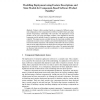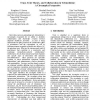55 search results - page 11 / 11 » Latent Variable Models for Causal Knowledge Acquisition |
94
Voted
CIKM
2011
Springer
14 years 11 days ago
2011
Springer
Machine learning often relies on costly labeled data, and this impedes its application to new classification and information extraction problems. This has motivated the developme...
119
Voted
CD
2005
Springer
15 years 6 months ago
2005
Springer
Abstract. Products within a product family are composed of different component configurations where components have different variable features and a large amount of dependency re...
104
Voted
IJAR
2002
15 years 5 days ago
2002
The usual methods of applying Bayesian networks to the modeling of temporal processes, such as Dean and Kanazawa's dynamic Bayesian networks (DBNs), consist in discretizing t...
81
Voted
HICSS
2003
IEEE
15 years 5 months ago
2003
IEEE
More than a process-automating tool, telemedicine is increasingly recognized for its ability to facilitate collaboration and knowledge creation between disparate healthcare provid...
139
Voted
CSDA
2007
14 years 12 months ago
2007
In blind source separation, there are M sources that produce sounds independently and continuously over time. These sounds are then recorded by m receivers. The sound recorded by ...


